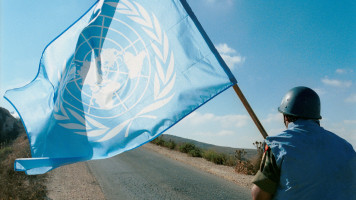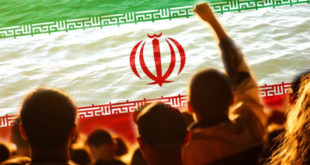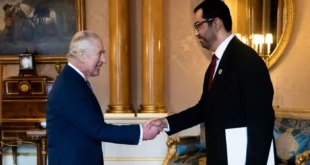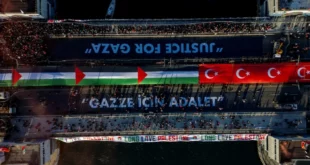Analysis: The presence of UNIFIL peacekeepers is an obstacle to Israel’s plans for depopulating south Lebanon and creating a buffer zone.
Since launching its ground invasion, Israel has carried out a series of unlawful attacks on the UN’s peacekeeping forces, who may see them as an impediment to its plans to create a buffer zone in southern Lebanon.
A confidential report leaked by the Financial Times on Tuesday underscored how Israeli troops have targeted UNIFIL – including by using the incendiary, internationally-banned chemical white phosphorus close to a marked UN base, injuring 15 peacekeepers.
The Israeli army also recently ploughed into and fired on UNIFIL observation towers, as well as “forcibly” entered one of UNIFIL’s positions and on a separate occasion hit a UN base with explosions, injuring two peacekeepers.
Israeli forces began directly firing on UNIFIL bases after 8 October, the leaked report said, although there had been incidents before nearby.
“Netanyahu wants to flex the Israeli military muscle and show they have the might to take Hezbollah on… UNIFIL is a nuisance to them,” Declan Power, an Irish security and defence analyst and former UNIFIL soldier, told The New Arab.
Rights watchdog groups have warned that Israel’s attacks on peacekeepers “amount to war crimes”. UN peacekeeping forces have been in southern Lebanon since 1978 to monitor the cessation of hostilities and help ensure humanitarian access to civilians. The mission is the most deadly of all UN peacekeeping operations, with 337 peacekeepers killed in hostilities since 1978.
Israel has said the UN forces are being used as “human shields” by Hezbollah, accusing the Lebanese armed group of stockpiling “large quantities of weapons” near their posts.
On 14 October – the day after Israel reportedly used white phosphorus near peacekeeping troops — Israeli Prime Minister Benjamin Netanyahu called on UNIFIL to withdraw from southern Lebanon.
“The IDF has repeatedly asked for this, and has been met with repeated refusals, all aimed at providing a human shield to Hezbollah terrorists,” Netanyahu said. “Your refusal to evacuate UNIFIL soldiers makes them hostages of Hezbollah.”
Israel’s ‘low tolerance threshold’
Since Israel’s ground invasion in early October, Israeli troops have engaged in intense fighting with Hezbollah in south Lebanon. Heavy Israeli airstrikes have also wiped out civilian infrastructure across the country, killing over 2,574 people and wounding over 12,001 since 8 October 2023, according to the Lebanese health ministry.
“Israel has a very low tolerance threshold now,” Power said. “There is an unspoken attitude that they’re there to punish anybody who has support from Hezbollah, whether you’re an active combatant in Hamas or Hezbollah or whether you’re a civilian – this extends to the peacekeepers, as well,” he added.
“They have unfinished business from 2006,” he said, referring to the 34-day war between Israel and Hezbollah, touted as a victory by Hezbollah and its supporters.
Video footage from south Lebanon shows entire villages flattened, the once-green groves of trees and bustling city centres reduced to piles of grey rubble.
In one video circulated on social media from 8 October 2024, Israeli soldiers raise their flag atop a pile of rubble in the Lebanese border village of Maroun al-Ras. However, Power said that he doubts Israel “has any stomach” to re-occupy Israel as it did between 1982 and 2000, considering the lack of military capacity with their troops tied down in Gaza.
Power was in southern Lebanon in 1996 and 1998, and remembers Israel’s occupation and military proxy, the South Lebanon Army (SLA). He said that Israel would be unlikely to attract a private army this time around, necessary to manage an occupation.
Instead, he said that Israel is likely to attempt to “dominate south Lebanon by attrition [continuous attacks to wear down the enemy] and the projection of forces, pushing Hezbollah back up to a point and then withdrawing”.
After withdrawal, Power said that Israel may try to keep Hezbollah back “using airpower and more minor incursions”, maintaining an “Israeli free fire” zone inside Lebanon that would be “too dangerous for normal habitation”.
This would be “cheaper than physical occupation” and would disrupt Hezbollah’s attempts to launch rockets from Lebanese border villages. But standing in the way of their plans is UNIFIL’s continued presence in the area, Power said.
Buffer zone
Israeli officials have called for creating a “south Lebanon buffer zone” to halt Hezbollah’s attacks in the north of Israel.
The head of Israel’s Northern Command, Ori Gordin, was advocating in early September for the military to be given the green light to seize and occupy a buffer zone in southern Lebanon, the Israeli daily, Israel Hayom, reported.
Days after Israel invaded Lebanon, its former national security adviser Meir Ben-Shabbat, a key ally of Netanyahu, wrote in Israel Hayom that de-populating the border area in Lebanon would be one way to ensure residents in northern Israel could return home.
The Lebanese news outlet, Naharnet, reported that Israel wants “its forces to enter south Lebanon by a depth of three kilometers and will leave it after cleaning the area of Hezbollah’s presence”, quoting diplomatic sources. The other seven kilometres would be the responsibility of UNIFIL and the Lebanese Army, and if the two sides “do not do what is required of them, it will take over the mission later,” according to the sources.
Ori Goldberg, an Israeli political analyst, told The New Arab that Israel’s ground incursion has been “heavily censored” with the Israeli military’s goals unclear to the majority of Israelis.
Israel has called on residents of southern villages to move as far north as the Awali River – almost 50 kilometres from the border and much farther north than the Litani River, which marked the UN buffer zone set following the 2006 war.
But Goldberg noted that “Netanyahu is not interested in a land grab”. He said that the incursion is “a political decision, not a military decision”, related to Netanyahu’s aims to boost his approval ratings.
“[Israel] is creating ‘debilitating chaos’ [in Lebanon],” he said. “But there isn’t any kind of master plan being followed or realised, or gradually pursued.”
He noted that the ‘Greater Israel’ movement – a far-right ideology pushing for the expansion of Israeli territory into “historic Biblical Land”, including Lebanon – is still “very sectoral”, isolated within “a settler agenda”, and is not reflected in Israel’s military operation in southern Lebanon.
Violations of UN Resolution 1701
Israeli politicians have on multiple occasions accused UNIFIL of failing to uphold UN Security Council Resolution 1701, which, adopted unanimously in 2006, called for a permanent ceasefire where Israel would withdraw from Lebanese territory and Hezbollah would disarm and move north of the Litani.
“The UN is a failed organization and UNIFIL is a useless force that failed to enforce Resolution 1701 and failed to prevent Hezbollah from establishing itself in southern Lebanon,” Israeli cabinet minister Eli Cohen said on X on 14 October.
“To blame UNIFIL for [1701 violations] is like blaming an ordinary police officer on the street for the poor laws of the land,” Power said.
“Things became very tense for UNIFIL, their mandate wasn’t really enforceable, and they didn’t have any kind of means to enforce it,” Power added. “Both parties started to flout the resolution despite having signed up to it voluntarily.”
Hezbollah was able to build its arsenal and rise to become one of the world’s most powerful non-state actors, but Israel also breached the terms of 1701, “routinely sending in specialist units” into southern Lebanon and continuously violating Lebanese airspace, Power noted.
“Israel had the right to feel concerned and defend itself, but I think they went about it the wrong way,” he said, noting that Israel “as a UN member” should have gone to the UN Security Council and insisted upon a review of the 1701 resolution.
“The feeling [among UNIFIL] is that the Israelis were being very cynical, and that it didn’t suit their strategic interests to have UNIFIL there and they wanted it to fail,” Power said.
‘Dangerous’ anti-UN narrative
“UNIFIL is a prop for [Israel], to show its omnipotence, to demonstrate that it doesn’t care anymore,” Goldberg, the Israeli analyst, said. He noted that Israel’s narrative of UNIFIL’s failure and collusion with Hezbollah is part of its efforts to present Lebanon as a “diabolical Hezbollah ploy”.
Power said that such narratives of UNIFIL facilitating Hezbollah’s activities are “extremely dangerous and inaccurate”.
He referenced an incident in October 2023, when Israeli forces fired on UNIFIL peacekeepers at the Lebanese border, injuring a Nepali officer.
“Some of the [Israeli] soldiers had been fed such an anti-UN diet, about the UN being complicit with Islamic extremists, that they could jump to the conclusion that these [peacekeepers] must be militants who had taken control of UN vehicles,” he said.
 Eurasia Press & News
Eurasia Press & News



